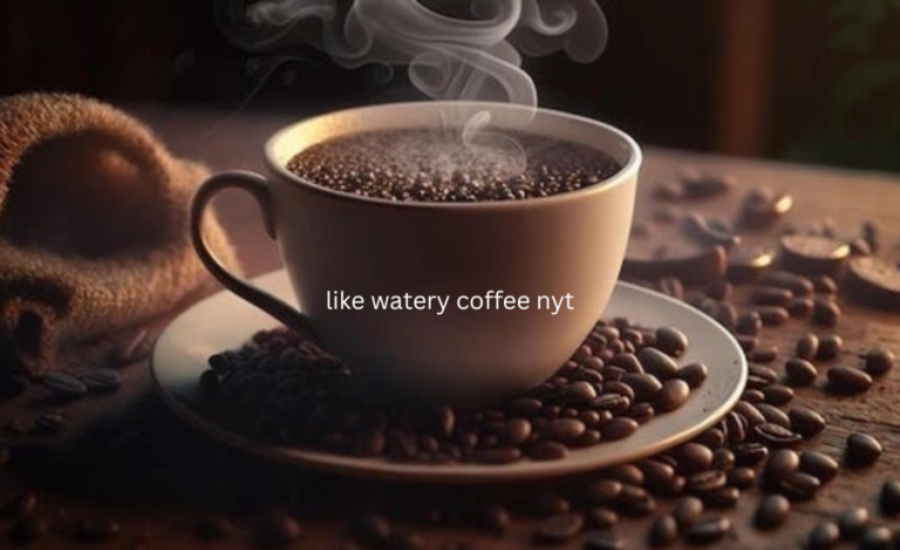In an era where screens mediate nearly every facet of life, the phrase “Like Watery Coffee NYT,” popularized by The New York Times, resonates as a sharp yet relatable metaphor for modern disappointment. Beyond its literal reference to a lackluster cup of coffee, it epitomizes the broader decline in richness, depth, and satisfaction across various aspects of daily living. At its core, it highlights a societal trend where the pursuit of convenience, quantity, and superficial appearances has led to an erosion of substance and meaning. Much like the disappointment of a weak coffee, these diluted versions of life’s offerings reflect a larger cultural phenomenon where satisfaction feels perpetually out of reach.
The Paradox of Abundance: Diluted Experiences in Modern Life

The world today offers endless opportunities for consumption, from entertainment to products, experiences, and knowledge. While this abundance appears liberating on the surface, it creates a paradox of dissatisfaction. Imagine waking up to a fresh cup of coffee, only to find that it lacks the expected richness—a letdown that parallels our engagement with much of modern life. The experiences we chase often feel hollow, much like drinking something that promises flavor but delivers blandness.
Every day, we are bombarded with choices: endless streaming options, infinite content online, and products customized to the smallest preferences. However, the pursuit of more often comes at the expense of better. Time once spent engaging deeply with a singular task or moment is now fractured by the need to multi-task and constantly stay connected. Much like watery coffee, our attempts to do it all lead to an experience that is neither memorable nor meaningful.
Relationships in the Digital Age: Connections Without Substance
The metaphor of Like Watery Coffee NYT extends beyond experiences and into the realm of human relationships. On the surface, it appears easier than ever to stay connected; digital platforms allow instant communication, enabling us to chat with loved ones across the globe. Yet, these interactions often lack the emotional depth of face-to-face conversations. Social media, while offering constant updates on people’s lives, frequently reduces relationships to mere exchanges of curated highlights rather than meaningful connection. Friends and family become icons on a screen, their realities hidden behind carefully crafted images and captions.
The prevalence of these virtual connections has led to a false sense of closeness. Like a cup of weak coffee that offers the form but not the flavor of a true brew, these superficial exchanges leave us craving something deeper and more authentic. The metaphor reminds us that while technology may offer convenience, it cannot replace the richness of meaningful interactions that nourish our emotional well-being.
The Consumer Trap: Quantity Over Quality

Modern consumer culture is another arena where the metaphor of Like Watery Coffee NYT finds its relevance. From food to technology and entertainment, many offerings promise to fulfill our desires but fail to deliver satisfaction. Take fast food, for instance: designed for convenience and mass production, these meals often lack the flavor, nutrition, and artistry that food can provide when prepared with care. Similarly, flashy advertisements promise revolutionary gadgets or life-changing experiences, yet many of these products fall short, leaving consumers feeling unfulfilled and tricked.
This pattern reflects a deeper issue within capitalism, where the focus on maximizing output often undermines the potential for meaningful value. Businesses churn out watered-down versions of products that look appealing but ultimately lack depth. The disappointment mirrors the experience of drinking a cup of coffee that fails to deliver its expected richness: we may feel temporarily sated, but the satisfaction is fleeting. This phenomenon extends beyond material goods to services, entertainment, and even relationships, shaping a culture where true fulfillment becomes increasingly elusive.
Art and Culture: The Devaluation of True Creativity
In the digital age, the democratization of content creation has allowed everyone to become an artist, writer, or creator. While this accessibility has sparked creativity, it has also resulted in an overwhelming flood of mediocre and repetitive material. Much like watery coffee that fails to satisfy a craving for richness, the sheer volume of superficial content dilutes the cultural landscape, making it harder to find works that resonate on a deeper level.
Platforms like YouTube, Instagram, and TikTok have revolutionized the way content is consumed, placing quantity and virality above originality and craftsmanship. The metaphor of watery coffee captures the frustration of sifting through this endless stream of material in search of something substantial—an experience that stimulates thought, emotion, or inspiration. True art and culture should nourish the soul, much like a perfectly brewed cup of coffee satisfies the senses. Yet, in a world oversaturated with diluted versions of creativity, finding such nourishment has become increasingly rare.
The Loss of Authenticity in a Globalized World

Globalization, while offering access to diverse cultures and ideas, has also contributed to a homogenization of experiences. For example, popular tourist destinations often offer pre-packaged, curated experiences that lack authenticity. Rather than immersing travelers in the local culture, these experiences present a polished and predictable version that caters to global tastes.
This dilution of cultural authenticity parallels the disappointment of drinking weak coffee—it may resemble the real thing, but it lacks the richness that makes it special. The same phenomenon can be observed in global consumer markets, where mass-produced goods often replace handcrafted, regionally distinct products.
The Spiritual Void: A Crisis of Meaning
Beneath the surface of modern dissatisfaction lies a deeper, spiritual void. In a society driven by materialism, external validation, and the relentless pursuit of success, many people find themselves feeling unfulfilled despite having more than ever before. The metaphor of watery coffee reflects this emptiness: life appears full on the surface, yet it lacks the flavor and richness that come from deeper meaning and purpose.
The constant chase for more—whether it be wealth, recognition, or possessions—often leads to a sense of disconnection from what truly matters. This spiritual crisis highlights the need to reconnect with experiences that provide genuine fulfillment. Just as a rich cup of coffee satisfies both the body and the soul, a life centered on authenticity, purpose, and connection offers a far deeper sense of satisfaction.
The Quest for Authenticity: A Return to Depth
In response to the diluted nature of modern life, there is a growing movement toward authenticity, simplicity, and depth. People are increasingly seeking out experiences, relationships, and lifestyles that prioritize quality over quantity. The slow living movement, for instance, encourages intentionality in everything from food and travel to work and leisure. By focusing on mindful consumption and deep engagement, individuals are finding ways to live richer, more fulfilling lives.
The metaphor of watery coffee serves as a powerful reminder of what is lost when we prioritize surface-level satisfaction over substance. Whether it is through reconnecting with nature, engaging in creative pursuits, or fostering meaningful relationships, the quest for depth reflects a collective desire to reclaim the richness of life.
Key Facts
- Metaphor Origin:
The phrase “like watery coffee,” popularized by The New York Times, serves as a metaphor for the lack of depth, satisfaction, and meaning in modern life.
- The Paradox of Abundance:
- Modern society offers endless choices—entertainment, products, and experiences.
- Despite this abundance, people often feel dissatisfied, as these options tend to prioritize quantity over quality.
- Relationships in the Digital Age:
- Digital connections offer convenience but lack emotional depth.
- Social media often reduces relationships to superficial exchanges of highlights rather than meaningful interactions.
- Consumer Trap:
- Modern consumerism prioritizes profit, speed, and mass production over genuine quality.
- Products and services often fail to deliver the richness and value they promise.
- Art and Cultural Dilution:
- Digital platforms prioritize viral, fast content over thoughtful, creative works.
- The cultural landscape is oversaturated with repetitive, mediocre material.
- Globalization and Authenticity Loss:
- Globalization leads to a homogenization of cultures and experiences.
- Unique regional traditions and products are often replaced with standardized, mass-produced versions.
- Spiritual Void:
- Despite material abundance, modern society faces a spiritual void driven by materialism and external validation.
- Meaningful fulfillment comes from simplicity, purpose, and authentic experiences.
- Slow Living Movement:
- There is a growing shift toward mindful consumption, intentional living, and prioritizing quality over quantity.
- The Call to Action:
The solution lies in rejecting superficial satisfaction and embracing experiences that offer richness, depth, and authenticity.
FAQs
Q: What does “like watery coffee” mean?
A: The phrase “like watery coffee” is a metaphor for experiences, relationships, or products that appear fulfilling on the surface but lack depth and substance, leaving a sense of disappointment.
Q: Why do modern experiences feel diluted?
A: Modern experiences often prioritize convenience, quantity, and superficial appearances, sacrificing the depth and richness that create genuine satisfaction.
Q: How has social media affected human relationships?
A: Social media makes staying connected easier but often reduces relationships to shallow interactions, replacing emotional presence with curated, highlight-driven exchanges.
Q: What is the paradox of abundance?
A: The paradox of abundance refers to the idea that while society offers endless choices and opportunities, the overabundance often leads to dissatisfaction as quality is sacrificed for quantity.
Q: How does consumerism contribute to modern dissatisfaction?
A: Consumerism focuses on producing goods and services for mass consumption, often prioritizing speed, profit, and quantity over true quality and value.
Q: Why is modern art and culture often criticized?
A: Digital platforms promote fast, attention-grabbing content, leading to a flood of repetitive and mediocre material that dilutes the presence of thoughtful, meaningful creative works.
Q: How does globalization dilute cultural authenticity?
A: Globalization often replaces unique regional traditions and handcrafted goods with standardized, commercialized versions designed for mass appeal.
Q: What causes the spiritual void in modern society?
A: The spiritual void arises from materialism, external validation, and the relentless pursuit of success, which overshadow meaningful relationships, self-expression, and moments of stillness.
Q: What is the slow living movement?
A: The slow living movement encourages intentional living, mindful consumption, and a focus on quality over quantity to create richer, more meaningful lives.
Q: How can we overcome the feeling of modern dissatisfaction?
A: To overcome dissatisfaction, individuals can prioritize authenticity, simplicity, and depth—whether through relationships, creativity, or lifestyle choices.
Related: Avenue-of-roses-branam-rd-portland-or
Conclusion
In a world where superficiality often takes precedence, the metaphor of watery coffee captures a universal sense of disappointment and longing. It highlights the dilution of experiences, relationships, art, and culture that characterizes contemporary life. However, it also serves as a call to action—a reminder to seek out richness, authenticity, and depth in all aspects of our lives. By rejecting the watered-down versions of fulfillment that society offers and embracing the pursuit of genuine experiences, we can rediscover the joy and satisfaction that come from a life lived with intention and meaning.
Ultimately, the antidote to modern dissatisfaction lies in our ability to slow down, reflect, and prioritize what truly matters. Just as a perfectly brewed cup of coffee offers comfort, flavor, and satisfaction, a life rooted in authenticity and depth has the power to nourish the soul and fulfill our deepest cravings.
Stay tuned in to this: Adn-237
